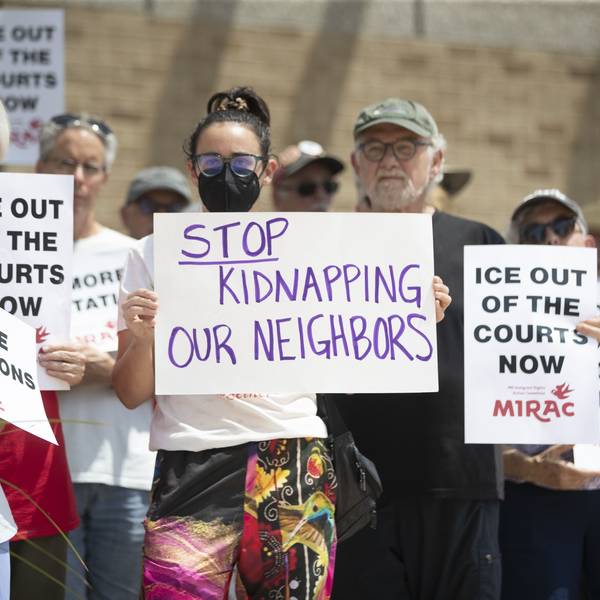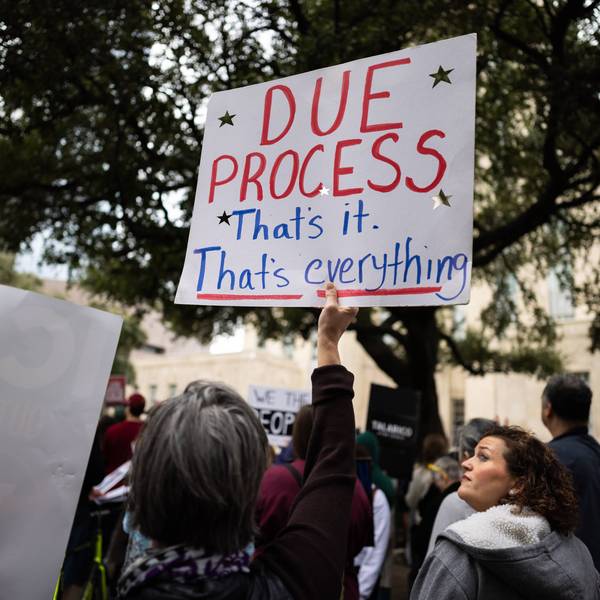President Donald Trump on Monday rolled out "Muslim ban 2.0"--a new executive order blocking entry to the United States to people from six majority-Muslim countries, a directive one civil liberties group says amounts to doubling down on religious discrimination.
Politico noted earlier Monday that in the roughly five weeks since his first now-blocked travel ban was issued, Trump has been "promising the public that the revised version would be substantially the same as the original--while telling courts just the opposite." Also during that time, two Department of Homeland Security (DHS) documents obtained by the press debunked the administration's rationale for any such travel ban.
The new ban will be effective March 16; the previous order went into effect immediately.
It blocks for 90 days people from Sudan, Syria, Iran, Libya, Somalia, and Yemen. Iraq has been left off the new list, as the country "has taken steps to increase their cooperation with the United States in the vetting of Iraqi nationals," a fact sheet (pdf) from the White House says. It also states that "the significant presence of U.S. forces in Iraq," contributes to its different treatment.
The executive order affects those who did not have already a valid visa by January 27, 2017. The first travel ban originally blocked even those with green cards and current visas from re-entry.
In addition, the new order blocks all refugees from entering the U.S. for 120 days. Unlike the previous version, Syrian refugees are subject to this same pause, not blocked indefinitely.
Following the signing of the order, DHS Secretary John Kelly declared at a press conference that "unvetted and unregulated travel is not a universal privilege."
According to David Cole, national legal director of the ACLU and a professor at Georgetown University Law Center, "The new order will be less catastrophic in its roll-out than the first, both because it exempts those who already have visas and because it will not go into effect until March 16. But it's still religious discrimination in the pre-textual guise of national security. And it's still unconstitutional."
And in response to the order's impacts on refugees in particular, David Miliband, president and CEO of humanitarian aid group International Rescue Committee, said it's "a ban that heartlessly targets the most vetted and most vulnerable population to enter the United States. This ban doesn't target those who are the greatest security risk, but those least able to advocate for themselves. Instead of making us safer, it serves as a gift for extremists who seek to undermine America."
Also decrying the order is advocacy organization Council on American-Islamic Relations (CAIR), with it national executive director Nihad Awad, saying in a statement, "As White House Adviser Steven Miller promised, this watered-down 'Muslim Ban 2.0' was retooled to achieve the same unconstitutional policy outcome as the first deeply-flawed order. We believe this desired policy outcome is in fulfilment of now-President Trump's campaign pledge to ban Muslims from entering the U.S. This order stills stigmatizes the faith of Islam and Muslim. It does not make America any safer, but does make America LESS great."
Critique of the order came not only from civil rights groups but some lawmakers as well. Rep. Barbara Lee (D-Calif.), for one, called it "heartless" and "xenophobic," adding, "Once again, we must reject this dangerous and unconstitutional action that undermines our national security." Vermont's Independent Sen. Bernie Sanders also joined the chorus, calling it "a racist and anti-Islamic attempt to divide us up."
"This isn't about keeping America safe. A president responsible for keeping our citizens safe would not hand over ideological ammunition to terrorists seeking new recruits to kill Americans," Sanders continued.
The original ban sparked protests across the nation and beyond--as well as multiple lawsuits--and immigrant and civil rights groups have already vowed to return to the courts to take on the new order.
Omar Jadwat, head of the ACLU's Immigrants' Rights Project, added: "The Trump administration has conceded that its original Muslim ban was indefensible. Unfortunately, it has replaced it with a scaled-back version that shares the same fatal flaws. The only way to actually fix the Muslim ban is not to have a Muslim ban. Instead, President Trump has recommitted himself to religious discrimination, and he can expect continued disapproval from both the courts and the people."



